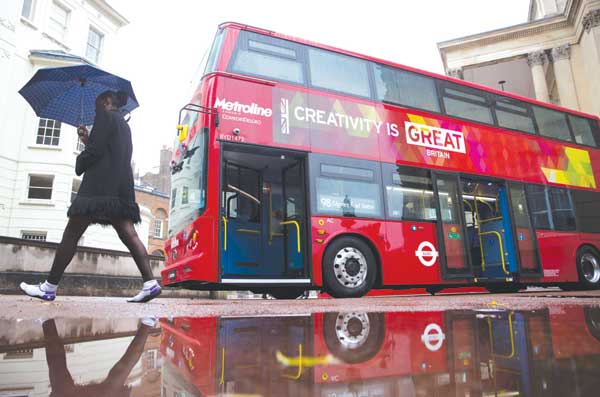Sino-UK electric cars racing forward
China-UK electric vehicle collaboration is pushing forward new technology as the market grows rapidly and benefits from international commitments to reduce carbon emissions.
|
 |
| A BYD bus is driven down a rain-soaked London street. REUTERS/NEIL HALL |
Last week, UK-based ELG Carbon Fiber and Chinese firm Adesso Advanced Materials Wuhu signed an agreement to jointly develop lightweight composite components that could be used to improve electric vehicle technology. It is the latest in a raft of such bilateral research agreements. The University of Nottingham is working with Chinese automotive company FAW Group on thermal management and improving thermal efficiency for electric and hybrid vehicles. The university also established a laboratory in Ningbo, China, to develop more efficient motors for electric and hybrid cars.
"The electric vehicle is the way for the future, and the UK and China are perfectly suited to work with each other," said Li Kang, a professor of intelligent systems and control at Queen's University Belfast.
Li said the UK leads on idea generation and China has the funding and market access to commercialize pioneering cutting-edge technology, meaning the partners complement each other very well.
In 2013, Li's team at Queen's University Belfast joined Cranfield University, Harbin Institute of Technology, and China's State Grid Electric Power Research Institute to establish electric vehicle research collaboration that focuses on improving electric vehicle battery efficiency, electric vehicle charging equipment, and developing wireless charging technology. The results of the research will be implemented in an electric vehicle project in China that will be used during the 2022 Winter Olympics.
China became the world's large electric vehicle market in 2015. In the first eight months of 2016, its market experienced the largest growth globally, with sales hitting 206,000 units during the period, up 160 percent on 2015.
Laboratory-based research breakthroughs can translate into major upgrades in electric and hybrid vehicle efficiency and cost-reduction for automotive firms, analysts say.
For example, current engine technology in hybrid vehicles can only turn less than 30 percent of fossil fuel energy consumed by the engine into useful energy that moves the vehicle. Research is exploring ways to recover some of the energy not being harnessed, said Yan Yuying, who leads the University of Nottingham's collaboration with FAW.
"Chinese companies are realizing and embracing the value of R&D collaboration with leading research universities, compared to the practice of buying technology from Western firms that they've traditionally commonly practiced," Yan said.
With advances in technology highly prized, many Chinese electric automotive firms have recently championed an internationalization strategy, with BYD the most successful example. BYD now supplies London's largest fleet of electric buses.
But challenges remain. The reputational challenge for Chinese automotive firms in international markets is bigger when it comes to electric cars, which are more expensive, said Felipe Munoz, global automotive analyst at JATO, a UK-based automotive research company.

























